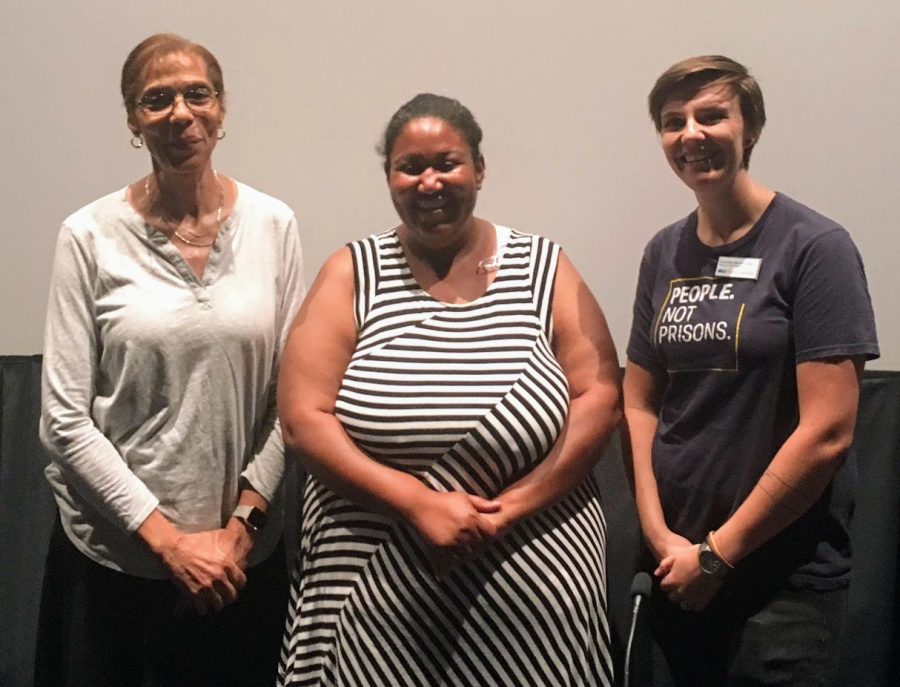Presentation educates perils of cash-bail system
Caroline Morin-Gage (left), Ashley Powell (center), and Babette Boyd (right) pose for a photo after lecturing about the cash-bail system in the U.S.
A presentation about the pitfalls of the U.S.’ cash-bail system for arrested persons was given to the public Thursday evening in UNC Wilmington’s Lumina Theater.
A panel of three, including attorney Caroline Morin-Gage, former addict Ashley Powell, and UNCW sociology and criminology professor Babette Boyd, showed four films detailing stories of low-income arrestees affected by the cash-bail system and answered questions on the films from the host. The evening concluded with a question-and-answer session from the audience followed by picture taking and one-on-one talking.
The cash-bail system allows criminals that can afford to pay a bond set by a judge to remain out of jail until their trial date. More expensive amounts are set for more severe offenses in order to make the accused appear in court. If they show up, the bond is returned. If they miss court, they lose that money even if they are found innocent.
To make the system more accessible, bail bondsmen are tasked with paying most of the bond while charging a fee-usually 10 percent of the amount. The only catch? The accused will not receive the money back, whether they appear in court or not.
The opening film detailed a twenty-year-old African-American girl who was given a $100,000 bond in 2013 for a theft worth less than $50. Although her family had a very low income, they did everything possible to pay the bail bondsman the required fee, which was 10 percent of the bond. The family was then required to make monthly payments of $250 for 32 months to avoid having to pay the $100,000. The 1963 Supreme Court case Gideon v. Wainwright promises indigent defendants attorneys in all stages of the legal process except for the bail hearing.
“Everyone knows that the bondsman will bail you at 10 percent, so if a prosecutor doesn’t want you out, they’ll want that number way high, so you have trouble getting that percentage,” Morin-Gage said. She made it clear that the state does this to make money or entice the suspect to wait in jail and eventually plead guilty. “In the very serious cases, that’s not really a problem, because you don’t want a serial killer out. So you’re going to ask for remand.” At any given time in the U.S., approximately 450,000 county jail inmates have not been tried.
The next film told the story of a thirty-year-old African-American man who was arrested and given a $22,000 bond for “matching the description” of another suspect. Despite being acquitted, he lost his job, and his girlfriend and toddler became desperate. The bail industry robs the poor and working classes of $14 billion annually and turns it over to the wealthy.
“White supremacy thrives on these systems, capitalism thrives on these systems,” Boyd stated. “So much money is made off these folks in every way you could possibly imagine, so there’s just not the same level of inspiration at the top level to challenge and dismantle them.”
The third film discussed the dangers of taking plea deals and how prosecutors tempt defendants into taking them. Many poor defendants accept them to receive a sentence of time served and limit further jail time. Prosecutors will also lure the accused by charging them harshly at the start of the case and then offering reduced charges. In 2013, almost 180,000 innocent Americans had pleaded guilty.
The last film of the evening described a man from New Jersey who was arrested on a minor charge and then released on his own recognizance. He was able to retain his job and be financially stable while awaiting his court date. That state has completely outlawed the cash-bail system.
Other states and jurisdictions have noticed these issues and eliminated their cash-bail systems. Alternatives such as unsecured bonds, probation-like conditions, substance abuse diversion programs and even citations in lieu of arrest are available.
Another popular strategy is risk assessments, which consider factors like intent, mental status, criminal history and the severity of the offense to decide whether the accused can be released pending trial. Jurisdictions like Durham and Mecklenburg Counties in North Carolina have used this method to greatly limit the number of people awaiting trial in their local jails. However, a disproportionate number of African-Americans are still awaiting trial in those jails.
The U.S. has a long history of mistreating its citizens of color. They were enslaved until 1865 and faced legal discrimination for the next century in the form of Jim Crow Laws. Today, African-Americans serve longer prison terms and are suspended and expelled from school more frequently than whites for the same offenses. People of color are also more likely to be unemployed and live in poverty.
The Philippines remains the only other country besides the U.S. to continue to use the cash-bail system.








